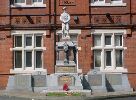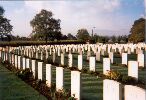
Newton-le-Willows and
Earlestown War Memorial

| OTHER WARS |
 |
Newton-le-Willows andEarlestown War Memorial |
 |
| The
Great War Roll of Honour |
|||||||||||||||||||||||||
There are only a few battlefield
crosses in the North West of England. One of these is at All Saints Church,
Newton-le-Willows, and originally marked the grave of Captain Carlton Collingwood
who is buried at Dive Copse Cemetery (Plot II Row E Grave 34) which is near
Sailly-le-Sec, a village twenty kilometres east of Amiens. In June 1916, before
the Somme Offensive, the ground north of the cemetery was chosen for a concentration
of Field Ambulances, which became the XIV Corps Main Dressing Station. A small
wood close by, under the Bray-Corbie road, was known as Dive Copse, after
the officer commanding the Main Dressing Station; and the cemetery was made
by these medical units.
All Saints Church also houses a memorial
to Captain Collingwood, along with photographs.
According to the “Newton and Earlestown Guardian” issue of August
18th 1916, Captain Carlton Collingwood was born in October 1889 and was the
eldest son of Mr. and Mrs. William Collingwood, whose Essex address was “The
Grove, Dedham”. Educated at Charterhouse, he was for three years in
succession a member of the Shooting Eight, and in 1907 captained it to second
place for the Ashburton Shield. He also represented his school as a featherweight
in boxing at Aldershot.
He served his apprenticeship in engineering at Armstrong and Whitworth’s,
Manchester, and then went to the Vulcan Foundry Co., Newton-le-Willows, where
he was appointed assistant manager.
In July, 1913, he married May, the youngest daughter of the late Alexander
Cavendish and of Mrs. Cavendish, Finchampstead, Berkshire. His death leaves
a widow and a son. Mrs. Collingwood’s brother, Major
H. C. Cavendish, was killed in the same week as her husband.
Captain Collingwood entered the 4th South Lancashire (Territorial) Regiment
in 1909, and resigned in 1913. He joined the South Lancashires again on August
3rd 1914, and got his Lieutenant’s commission on August 26th 1914. He
went to France with the Battalion in early 1915, but was invalided back home
in the April. He again filled his position of Assistant Works Manager at the
Vulcan Foundry. However, his health broke down again, and he had to go into
hospital. On regaining his strength, Lieutenant Collingwood again joined up,
and returned to the front in April 1916 with a Captain’s commission.
He was wounded at about 4-30 a.m. on August 8th 1916, and died on reaching
the Dressing Station. Sergeant Major Wheeler and four of his men carried him
to the Dressing Station as soon as he was wounded, gallantly risking their
own lives to do so.
Captain H. Whalley-Kelly, in his book “Ich Dien”, gives an account
of the circumstances surrounding Captain Collingwood’s death:
“On 7th August a local attack on Guillemont village was made by troops
of the 55th Division, and “D” Company of the Battalion was attached
to the 164th Infantry Brigade for the operation. “D” Company was
divided into two, the right half under Captain C. Collingwood and the left
under Second-Lieutenant G. C. Coury, working in conjunction, respectively,
with the 1st/8th King’s and 1st/4th King’s Own. In each case the
role of the Pioneer parties was to dig communication trenches from the newly-captured
positions back to our original line; a task involving great risks, as the
troops had to work in the open, swept by machine-gun and shell fire.
“At 4.20 a.m. the attack went forward, closely followed by the two half
companies of the 1st/4th, their Lewis gunners providing local covering fire.
To describe the confused fighting that followed is outside the scope of this
chronicle, suffice it to say that the assault broke down, but not before the
right half company had constructed sixty yards of communication trench, while
the left half company had dug, in one hour, a hundred yards of trench five
feet deep; a magnificent effort on the part of “D” Company which
cost it 2 officers (including Captain Collingwood) and 6 other ranks killed,
and 1 officer and 47 other ranks wounded, plus 5 other ranks missing.”